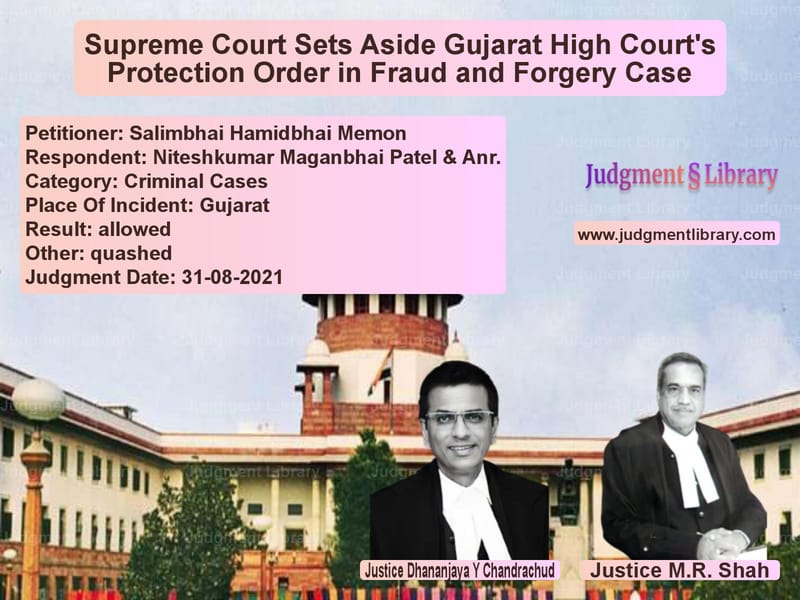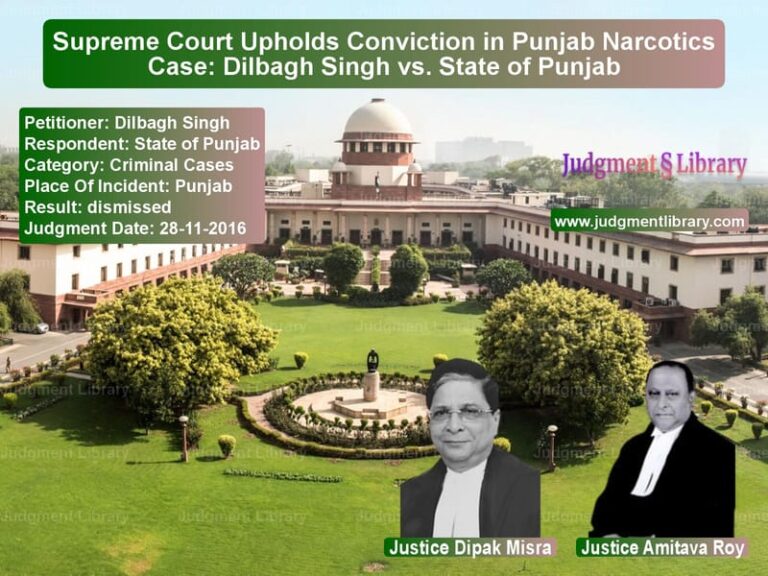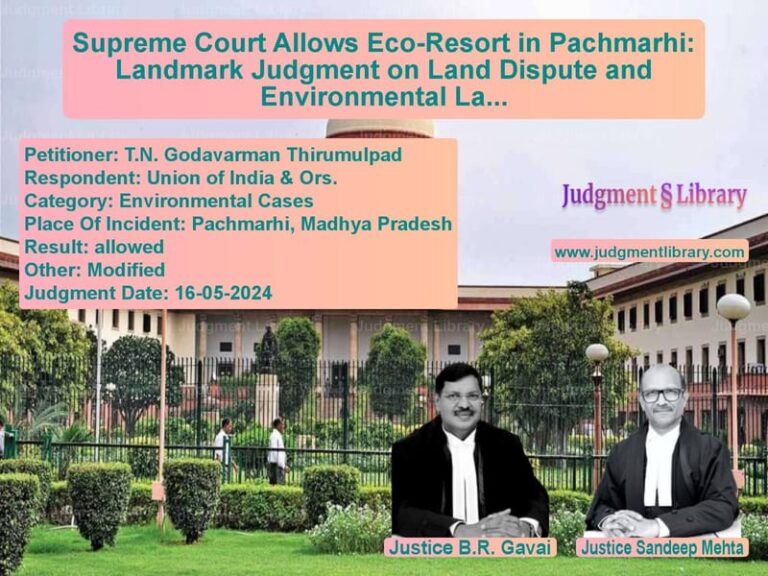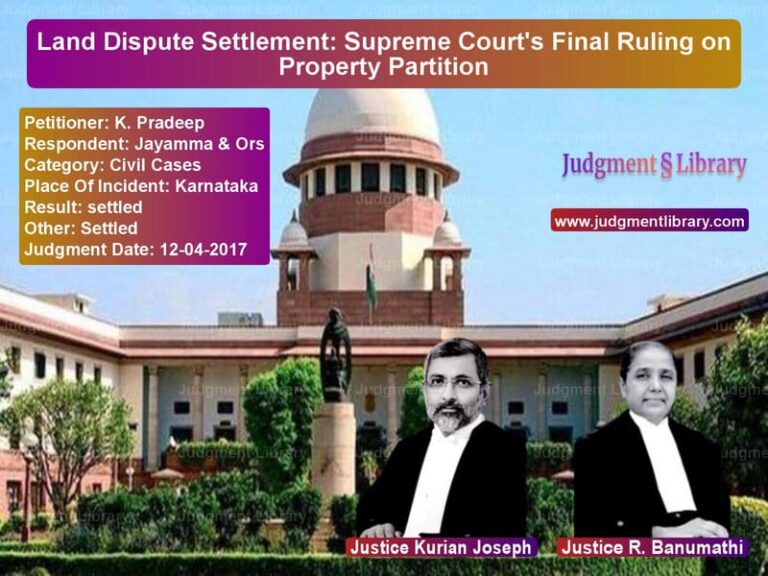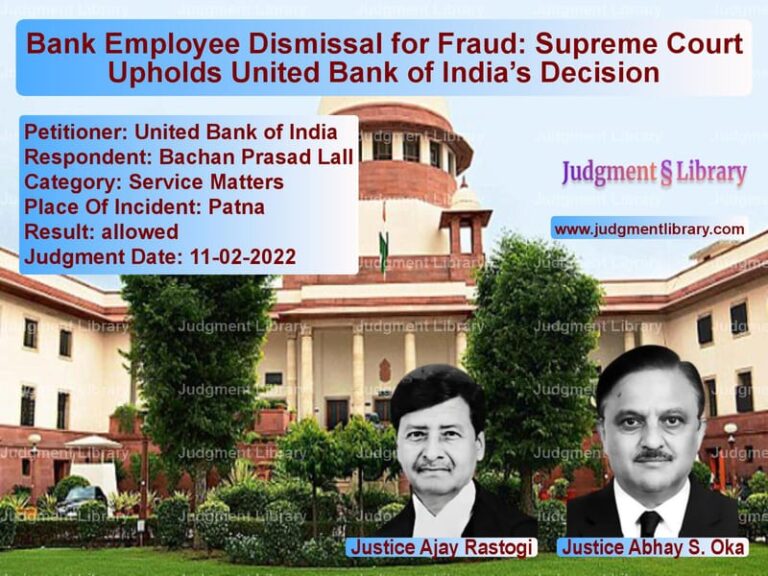Supreme Court Sets Aside Gujarat High Court’s Protection Order in Fraud and Forgery Case
The case of Salimbhai Hamidbhai Memon v. Niteshkumar Maganbhai Patel & Anr. is a significant ruling where the Supreme Court of India set aside an order of the Gujarat High Court that had restrained the arrest of the respondent despite serious allegations of fraud and forgery. The Court emphasized the need for judicial accountability and proper reasoning when granting interim protection in criminal cases.
Background of the Case
The case arose from a dispute over a partnership business. The appellant and the first respondent were partners in Calla Associates, a firm constituted through a partnership deed dated 10 October 2010. The first respondent allegedly committed financial misappropriation, document forgery, and fraud to deprive the appellant of his rightful share in the partnership assets.
Key events in the dispute include:
- A 2017 agreement (sammati-lekh) where the appellant allegedly consented to the sale of land and gave up claims to Rs. 3.89 crores of his investment.
- A 2018 addendum adjusting financial payments and promising a payment of Rs. 5.03 crores to the appellant.
- Forgery allegations where the first respondent allegedly manipulated internal pages of documents to fraudulently transfer ownership of additional land parcels.
- The dishonor of cheques worth Rs. 1.47 crores and Rs. 81.31 lacs.
- A police complaint in February 2018, initially disposed of as a civil dispute.
Petitioner’s Arguments
The petitioner (appellant) argued that:
- The first respondent forged a deed of relinquishment to include additional properties.
- The deed of dissolution of partnership was fabricated while the appellant was abroad.
- Despite settlements, payments due to the appellant were never honored.
- The Gujarat High Court had improperly restrained the arrest of the first respondent without sufficient reasoning.
Respondent’s Defense
The respondent countered that:
- Lands were transferred to the appellant as part of settlement agreements.
- Payments were made through post-dated cheques, some of which were honored.
- The dispute was civil and did not warrant criminal proceedings.
- The Gujarat High Court had rightly protected him from arrest.
High Court’s Decision
The Gujarat High Court had initially directed that no steps should be taken against the respondent while allowing the investigation to continue. The court reasoned that since the dispute involved financial transactions and settlements, arrest should be avoided.
Supreme Court’s Ruling
The Supreme Court set aside the High Court’s order, emphasizing that:
- The allegations involved serious offenses like fraud, forgery, and criminal breach of trust.
- The High Court’s oral directions restraining arrest were irregular and lacked proper judicial reasoning.
- The court must not interfere with investigations unless strong grounds exist.
- Judicial accountability requires that courts provide clear reasoning when granting interim relief.
Key Observations from the Judgment
The Supreme Court held:
“The procedure followed by the High Court of issuing an oral direction restraining the arrest of the first respondent was irregular… Oral observations in court are in the course of a judicial discourse. The text of a written order is what is binding and enforceable.”
The Court further noted:
“Judges speak through their judgments and orders. The written text is capable of being assailed. The element of judicial accountability is lost where oral regimes prevail.”
Final Judgment
The Supreme Court quashed the Gujarat High Court’s order, holding that:
- The allegations warranted a proper investigation, including the possibility of arrest.
- The High Court failed to justify its interim order protecting the respondent.
- The trial court should proceed with the case on its merits without interference.
Impact of the Judgment
The ruling reinforces judicial discipline and the importance of providing clear reasoning when granting interim protection. It ensures that courts do not arbitrarily restrain police action in serious criminal cases, maintaining the integrity of legal proceedings.
Petitioner Name: Salimbhai Hamidbhai Memon.Respondent Name: Niteshkumar Maganbhai Patel & Anr..Judgment By: Justice Dhananjaya Y Chandrachud, Justice M.R. Shah.Place Of Incident: Gujarat.Judgment Date: 31-08-2021.
Don’t miss out on the full details! Download the complete judgment in PDF format below and gain valuable insights instantly!
Download Judgment: salimbhai-hamidbhai-vs-niteshkumar-maganbha-supreme-court-of-india-judgment-dated-31-08-2021.pdf
Directly Download Judgment: Directly download this Judgment
See all petitions in Fraud and Forgery
See all petitions in Bail and Anticipatory Bail
See all petitions in Judgment by Dhananjaya Y Chandrachud
See all petitions in Judgment by Mukeshkumar Rasikbhai Shah
See all petitions in allowed
See all petitions in Quashed
See all petitions in supreme court of India judgments August 2021
See all petitions in 2021 judgments
See all posts in Criminal Cases Category
See all allowed petitions in Criminal Cases Category
See all Dismissed petitions in Criminal Cases Category
See all partially allowed petitions in Criminal Cases Category

